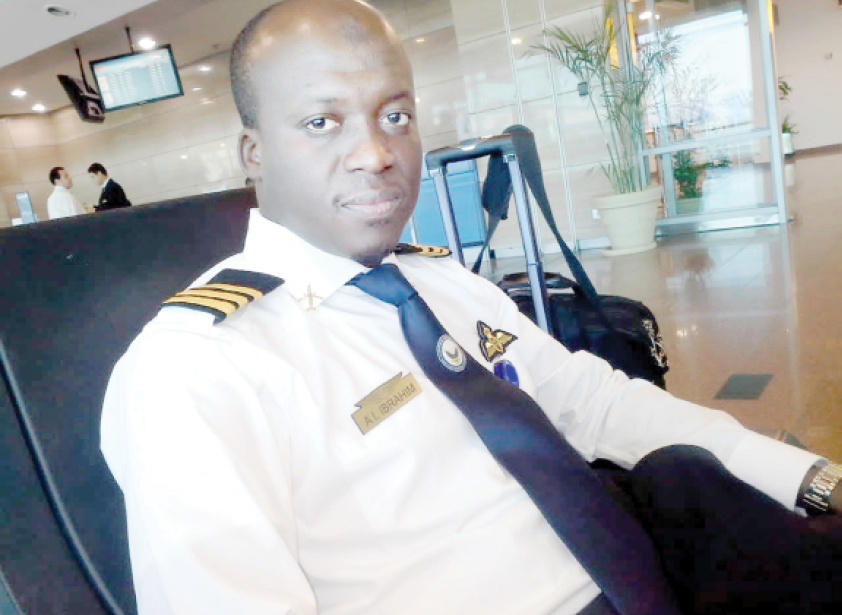Meet Abubakar, Kano-based unemployed pilot who is now a tailor
Ishaq Ibrahim Abubakar, 38, was among 100 young graduates the Kano State government sponsored to attend a professional pilot training abroad in 2013. However, despite completing the training successfully and returning home, he has been left to make ends meet as a tailor. Abubakar was born at Fagge Quarters in Fagge Local Government Area of […]

Ishaq Ibrahim Abubakar
Ishaq Ibrahim Abubakar, 38, was among 100 young graduates the Kano State government sponsored to attend a professional pilot training abroad in 2013. However, despite completing the training successfully and returning home, he has been left to make ends meet as a tailor.
Abubakar was born at Fagge Quarters in Fagge Local Government Area of the state. He did all his schooling in the state up to a Bachelor of Science in Physics degree from Bayero University, Kano.
He considered himself fortunate when in 2013 he was selected to be among 100 Kano State indigenes that were sponsored by the state government to Jordan for professional pilots training.
Abubakar was brilliant enough as he obtained his Commercial Pilot License with an ‘A’ rating in multi-engine aircraft as commercial pilot certification and other relevant papers at the end of his training.
However, since he returned to Nigeria in 2015, he has not had the opportunity to fly a plane or even be on a crew. He has remained an unemployed pilot despite having certificates which include the Multi-Crew Course (MCC) certificate and Crew Resource Management Certificate (CRM) with RELTER exam – an English Telephoning speciality for pilots.
So, in order to source for livelihood, Abubakar has been forced to take to tailoring, which incidentally was a craft he learnt while growing up. This is to help him to augment the little he gets from other jobs he does such as classroom teaching.
His plight as a trained pilot is said to be associated with some requirements which bother on financial commitments for him to be fully engaged as a pilot.
Abubakar said: “It is a requirement that any pilot in any part of the world after graduating from the flying academy needs extra training for specialisation.
“His/her license alone is not valid for him/her to be directly employed in the commercial aviation sector unless he or she has a speciality in one particular aircraft based on the company’s choice or based on his choice.”
According to Abubakar, that specialisation is termed as type-rating in the aviation sector, adding that it is a course which is mandatory by air law to select one particular aircraft to have a speciality on.
The cost of getting this specialization training is a major challenge currently being faced by most of the Kano government-sponsored pilots because after having completed the type-rating in Nigeria, some companies may say they still have low hours, he added.
“By the time we graduated from the flying academy, we had about 226 hours on piston engines. And you know in commercial aviation we are dealing with jet engines.
“So they want you to have a certain minimum number of hours on that jet engine. Still, some companies may say you have fewer hours for the jet engine therefore you must undergo another special programme called line-rate which most of us could not afford, “he said.
Abubakar said he has not flown any plane since 2015 when he returned to Nigeria and his attempt to fulfil the criteria for employment as a pilot has been to no avail.
He lamented that it is painful that the huge amount of taxpayers’ money spent to train him and most of his colleagues is wasting away as they have not put their knowledge to use.
“I used to say time without number that if a substantial amount of money can be spent on some people or somebody, I think it is not right to leave such investment to go in vain.
“At least N11 million is said to have been paid for the training of each of these 100 pilots. That amount, I think is enough to develop other sectors of the economy and positively touch the lives of our citizens. That is why many people looked at the government gesture as a waste,” he said.
He, therefore, appealed to the federal government through the Ministry of Aviation and all the parastatals under the ministry to sit with stakeholders to explore avenues through which pilots like him can gain the requisite exposure for full specialisation.
“I want the government to intervene, to sit down with the airline operators, to see how people like me who have been trained with public funds can be employed.
“We are aware that several interventions have been offered to various sectors of the Nigerian economy. We are soliciting for similar intervention to be extended to the aviation sector with terms and conditions,” he urged.
